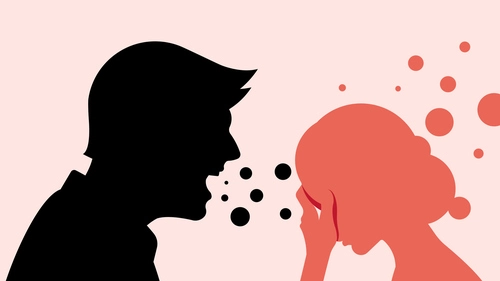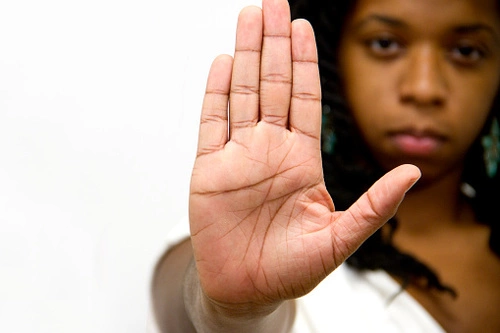1. Select a discrete app icon.

notes
Ask Amanda: Is It Normal That My Husband Hits Me?
It’s not always that easy to recognize domestic violence, or admit you’re a survivor
- Apr 03, 2024

Q: Is it normal that my husband hits me? I grew up in a house where things like yelling, throwing things and hitting each other happened often. My parents, grandparents, aunts and uncles all have explosive tempers. I don’t like that my husband loses his temper and hits me because it reminds me of when I was growing up, but I don’t know if this is what domestic violence is exactly. Also, a lot of times he says it’s not a hit. He’s just shoving me to get my attention, or he says he’s joking around. What do you think
First, I’m sorry this is happening to you now, and that it was something you also endured in your childhood. I’m here to say that, unequivocally, without question, no, this is not right. Hitting is a type of physical abuse and not part of a healthy or safe relationship.
But to your question of, “Is it normal?” —to you and to others who grew up seeing violence in their home on a regular basis, yes, unfortunately, it probably feels very normalized. But no, hitting your spouse is without a doubt not OK. You do not deserve to be hit, ever, by anyone. You do not deserve to be degraded or intimidated by your husband. You should feel safe at all times when you are with your partner.
Domestic violence is a repeated pattern of power and control over someone else using tactics like physical abuse, as well as verbal and emotional abuse. It’s different than someone who loses their temper once in a while and then regrets it. We’ve all had stressful days, but all of us don’t hit our partners in response to those days. Hitting is a sign that your husband wants to show he has power over you—the power to hurt you if you don’t do what he wants you to do.
Especially given your history of childhood domestic violence, your husband’s lack of sensitivity toward that makes his abuse all that more harmful. A healthy and respectful partner would go out of their way to avoid compounding your previous trauma and stress.
Abusers rarely limit their tactic to just hitting. If you look at your relationship, you may be able to see the other red flags that have popped up in the past. Have you noticed any of these signs of abuse?
- Feeling like you’re being controlled. Your husband needs to know where you are at all times, who you’re with, when you’ll be back, etc. He may check your phone, computer browser history or ask you to “check in” with him when you go somewhere.
- You see two sides to your husband. Others see him as a good person, but behind closed doors, he is angry and aggressive toward you.
- He’s admitted to being abusive in other relationships.
- He puts you down, calls you names, criticizes things you do, makes fun of you or your appearance, or makes it a point to try and tear you down when you’re happy.
- You’ve seen him be abusive to children, pets or other animals.
- He is continuously jealous and possessive. He may try to isolate you from your friends and family.
- He controls all the money in the house and/or makes it impossible for you to be financially independent.
- He has quickly changing moods, leaving you on edge or feeling like you’re walking on eggshells.
- He doesn’t show remorse after he hits you or yells at you. Or he tries to convince you it didn’t happen at all, or wasn’t as bad as you remember. This is called gaslighting.
- He’s sexually aggressive or forceful. (Yes, a husband can rape his spouse and yes, it is illegal.)
- He puts his hands or an arm when he’s angry or during sex, or puts an arm around your neck from behind to cut off air flow. Strangulation is a severe sign of escalation and should be considered a warning sign of homicide.
You may read this list and realize that a few or many of these things have been true for a while. At the same time, you may also be thinking, but he’s a good man. He provides for me.
Or maybe you think, he treats me well most of the time.
My family likes him.
He’s working on improving himself.
All of these things can be true at the same time. Partners can be abusive one day and treat their significant other well the next. It doesn’t excuse the abuse. But it doesn’t make the abuse part OK. In most cases, abusers will begin to escalate their abuse over time. Their abusive tactics will become more frequent and more severe. This could lead to increased risks to your health, a deterioration of your mental health and also put you at risk for homicide.
You may have a hard time coming to terms with this because of how normalized it sounds like violence was in your childhood. Sybil Cummin is a licensed professional counselor with Arvada Therapy Solutions in Colorado and the host of The Rising Beyond Podcast. She specializes in working with domestic violence victims. I asked her about your question. She told me that generational trauma, including domestic violence, means you are more likely to look past a partner’s abuse.
“There is often an experience of conditional love or caregiving so they don’t have an idea of what unconditional love feels like,” she says. In other words, you may have learned that you need to behave a certain way in order to keep peace in your home and be loved by a partner when really, you deserve to feel safe no matter what.
Cummin says it’s not easy to come to terms with the fact that you’re a survivor of domestic violence. Domestic violence can come with a stigma that many survivors don’t necessarily want to be attached to. You may think, that’s just not me. I’m not a victim. But the fact of the matter is, abusive partners target all sorts of individuals of all socioeconomic and education levels, in all types of families and communities in every city and every state.
Bottom line: There is no one “type” of person who finds themselves trapped in domestic violence. You are not alone in this, and you are not to blame for this. There’s nothing you did to deserve his abuse or the abuse in your childhood—abuse is an abuser’s choice.
It’s also important to remember that abuse can start subtly. As Cummin reminds us, if we were hit by someone on our first date with them, there’d never be a second date. But abuse doesn’t start that way.
“They’re first going to demean you, then throw things around like a toddler, then push you, etcetera. This becomes the relationship,” she says. This is why it can take a while before you even realize what’s happening and how long you’ve been enduring it.
It might be helpful to start writing down everything you experience or notice that I outlined above as a red flag. Keep your journal somewhere safe where your husband can’t find it or keep an electronic journal on your phone and password protect it. It may help you notice that there’s a continual pattern of control and violence.
When you’re able to admit to yourself that what your partner is doing is wrong, you have several options. I would recommend taking some time apart for your safety and to help you think more clearly without his influence. You can reach out to a domestic violence shelter near you if you need somewhere to go. Creating a safety plan first is highly recommended. Advocates at the hotline can also help you safety plan and consider next steps.
If you choose to, ending the relationship may not be as easy as simply saying you’re through. When an abusive partner senses they’re losing control of their spouse, they often increase the abusive tactics in an attempt to intimidate you into staying. They could also go the opposite way and make grand promises of change. They could love bomb you in order to “win you back.” They could try to tell you that no one else will ever love you—degrading a survivor’s self-esteem is another tactic of control.
“Leaving on your own is really, really hard. So make sure you’re putting a support system in place,” says Cummin. “Find someone who will believe you and will listen.”
Since you grew up in this normalized version of domestic abuse, there’s a good chance your family may not understand or even be supportive if you decide to leave this relationship. They may not be your go-to support system. Reach out to a domestic violence organization near you and inquire about support groups. Or, read our article about finding support online with other survivors going through something similar.
No matter what you choose, just know that you deserve to feel safe at home. Feeling safe may feel foreign to you at first because of how you grew up, but you still deserve it. It may help to read this essay, “Never Settle For Less Than You Deserve Again.”
Have a question for Ask Amanda? Message us on Facebook, Twitter or email AskAmanda@DomesticShelters.org.
Ask Amanda is meant to offer helpful resources and information about domestic violence. If in crisis, please reach out to your nearest domestic violence shelter for the guidance of a trained advocate.
Donate and change a life
Your support gives hope and help to victims of domestic violence every day.
Looking for someone to speak with? Enter your location to find phone numbers for domestic violence experts in your area.
Have a question about domestic violence? Type your question below to find answers.







